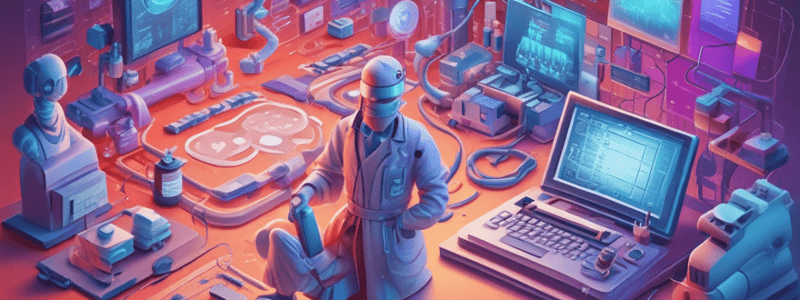Podcast
Questions and Answers
Health data and health information are often used interchangeably.
Health data and health information are often used interchangeably.
True (A)
Health data quality has no impact on its use.
Health data quality has no impact on its use.
False (B)
Maintaining patient records is not a major purpose in healthcare data analysis.
Maintaining patient records is not a major purpose in healthcare data analysis.
False (B)
Big data and analytics have no impact on the trend toward healthcare data.
Big data and analytics have no impact on the trend toward healthcare data.
Health information technology has no role in the management of healthcare data.
Health information technology has no role in the management of healthcare data.
Health care data, when unprocessed, is generally very useful for decision making.
Health care data, when unprocessed, is generally very useful for decision making.
Health information is only created by health care providers and health plans.
Health information is only created by health care providers and health plans.
HIPAA stands for Health Information Processing and Analysis Act.
HIPAA stands for Health Information Processing and Analysis Act.
EMR and EHR always refer to the same thing and can be used interchangeably.
EMR and EHR always refer to the same thing and can be used interchangeably.
Protected health information (PHI) is a term used to refer to health data that is not sensitive.
Protected health information (PHI) is a term used to refer to health data that is not sensitive.
Health care information is stored separately from patient records.
Health care information is stored separately from patient records.
Accounting/Billing departments are not responsible for verifying insurance coverage.
Accounting/Billing departments are not responsible for verifying insurance coverage.
ICD-10 stands for International Center of Diseases, Tenth Revision.
ICD-10 stands for International Center of Diseases, Tenth Revision.
CPT is an abbreviation for Central Procedural Terminology.
CPT is an abbreviation for Central Procedural Terminology.
The ICD-10 coding system was developed by the World Health Organization (WHO).
The ICD-10 coding system was developed by the World Health Organization (WHO).
Personal Health Records (PHRs) are only used by healthcare providers.
Personal Health Records (PHRs) are only used by healthcare providers.
The Personal Health Account (PHA) is the primary focus of the National E-Health Program.
The Personal Health Account (PHA) is the primary focus of the National E-Health Program.
The Ministry of Public Health oversees the implementation of National E-Health Program.
The Ministry of Public Health oversees the implementation of National E-Health Program.
PHRs usage increased from 5% in 2008 to 17% in 2013.
PHRs usage increased from 5% in 2008 to 17% in 2013.
PHRs have no impact on medication adherence.
PHRs have no impact on medication adherence.
The PHR was initially envisioned to enable individuals to share their information only with healthcare professionals.
The PHR was initially envisioned to enable individuals to share their information only with healthcare professionals.
National E-Health Program focuses solely on administrative health information systems.
National E-Health Program focuses solely on administrative health information systems.
The Ministry of Public Health is actively involved in supporting the implementation of PHRs.
The Ministry of Public Health is actively involved in supporting the implementation of PHRs.
Usage statistics show that PHRs are not widely adopted in Chennai, India.
Usage statistics show that PHRs are not widely adopted in Chennai, India.
The use of PHRs and personal health applications can have a negative impact on medication adherence.
The use of PHRs and personal health applications can have a negative impact on medication adherence.
Specialty hospitals had a higher EHR adoption rate compared to general medicine hospitals due to eligibility for HITECH incentive payments.
Specialty hospitals had a higher EHR adoption rate compared to general medicine hospitals due to eligibility for HITECH incentive payments.
By 2014, 79% of primary care physicians had adopted a certified EHR system.
By 2014, 79% of primary care physicians had adopted a certified EHR system.
Physicians in solo and small group practices were more likely to have adopted EHR systems.
Physicians in solo and small group practices were more likely to have adopted EHR systems.
In 2007, 44% of home health and hospice agencies had adopted EHR systems.
In 2007, 44% of home health and hospice agencies had adopted EHR systems.
The adoption of EHR systems in community health centers was at 98%.
The adoption of EHR systems in community health centers was at 98%.
Flashcards are hidden until you start studying




